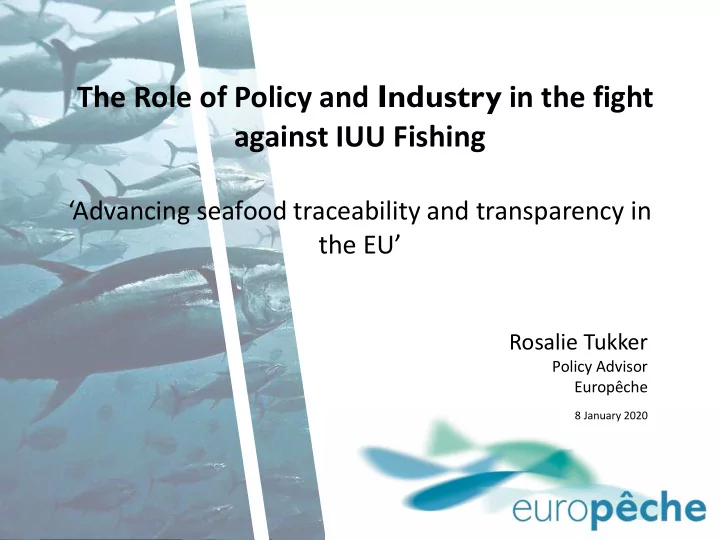

The Role of Policy and Industry in the fight against IUU Fishing ‘Advancing seafood traceability and transparency in the EU’ Rosalie Tukker Policy Advisor Europêche 8 January 2020
Setting the scene • The EU is the world’s largest market for fisheries and aquaculture products, absorbing 24 % of total global imports in 2016, and is dependent on imports for over 60 % of its consumption of such products Top five species EU Export consumed in the EU: 1.79 mln EU Import tuna tonnes 9,05 mln cod tonnes salmon EU Market Alaska pollock supply shrimps Representing 43% of 14,22 mln the market in 2016, but EU tonnes mostly imported from Production non-EU countries 5,17 mln 5% world tonnes catch Source: The EU Fish Market , 2018 edition, EUMOFA
Illegal fishing (IUU) IUU fishing identified as a significant issue for seafood markets worldwide. Estimates from 2009 showed: • 10-20 million tonnes of fish caught illegally every year (≈ 15% world’s catch ) • Value of US$10-23 billion • In the EU represented 9% (500,000 tons) and 10% of the value of the imports ( € 1.1 billion) (2008 estimates) No new estimates available globally nor for the EU Time to update EU & global estimates to assess the performance of the IUU policy?
IUU Consequences Environmental Damages to marine biodiversity, protected species and habitats Undermines efforts for better governance and sustainable fisheries Jeopardizes efforts to rebuild fish stocks Distorts the scientific assessment of the stocks Economic Loss of market shares – unfair competition Decrease of market prices due to the sale of cheap IUU products Financial loss for public authorities via licenses and taxes Harms the image of the fishing industry – need for private certification Social Job losses for legal fishermen facing competition from IUU operators IUU inextricably associated with very poor level of social standards Developing countries particularly vulnerable to IUU fishing, with limited capacity for control and surveillance of their waters Threatens the livelihoods of small-scale fishers: food security and poverty alleviation
EU response to IUU fishing IUU Regulation 1005/2008 Port access conditions Entered into force in January & 2010 Inspections Community Sanctions & Complemented by: Alert Infringements System “Control Regulation” (2009) (under revision) IUU “Regulation on the Regulation sustainable management 1005/2008 of external fishing fleets” (2017) Community Catch IUU vessel Certificate and country Scheme lists More than 30 countries improved their systems to fight Non- cooperating IUU & over 200,000 catch certificates are processed Third Countries annually in the Union
EU response to IUU fishing Spain best practice example The OPAGAC/AGAC fleet developed in 2016 a certification scheme for Responsibly-Caught Tuna = APR (UNE Regulation 196005) AENOR, one of the certifiers of that standard, also developed a Chain of Custody regulation by which, canners can label their tuna cans if it is sourced with tuna certified APR SP, 1 st to launch blockchain technology for seafood products . Fresh hake sold by Carrefour including a QR code on the label to be scanned by smartphones for the consumer to know which vessel caught it, coordinates fishing area, fishing gear used, exact location of landing, how prepared and when delivered to Carrefour.
How to tackle IUU fishing International joint action Integrative approach Control and enforcement
Next steps IUU Regulation – ANNEX II Catch Certificate Footnote: same conditions as established in the Control Regulation
Next steps The IMO Number is widely IMO MO recognised as the best available number UVI for the global fishing fleet, Control & IUU Regulation it should be strengthened & promoted under the catch Opposite to EU vessels, IMO/ certification scheme, RFMOs Unique Vessel Identifiers and private certifications (UVI) numbers are not mandatory for non-EU vessels Type(s) of fishing gear ” as a data Gear ear & to supply their catches into field on the catch certificate catc tch h the EU market under the Catch area(s) and dates ” according areas catch certification scheme to FAO area divisions and indicate established by the IUU whether caught in high seas, RFMO Regulation regulatory area or within an EEZ Step up efforts to better coordinate & harmonise import controls via the CATCH Promote the establishment of an Inte ter- system + interoperability of IT international register of fishing nati tiona nal vessels systems between MSs and 3 rd reg egis iste ter countries
Next steps • Alignment of IUU policy with labour policy - ILO Convention 188 on Work in Fishing (yellow card – Thailand/Taiwan) • Use IUU “muscle” to combat labour abuse (often linked) • Requires the acknowledgement of a different legal background (C188 transposed in the EU through Directive (EU) 2017/159) • Not many foreign vessels calling at EU ports …
Next steps • Need to find other ways to stop seafood imports caught using forced labour: DG EMPL + DG TAXUD • The Union Customs Code sets prohibitions or restrictions on imports, exports or goods in transit when they are justified on grounds of: public morality, public policy or public security, the protection of health and life of humans , animals or plants, the protection of the environment , the protection of national treasures possessing artistic, historic or archaeological value and the protection of industrial and commercial property • Stop imports from fishing vessels blacklisted for labour abuse?
Do we want to market this fish in our countries? Can our fishermen compete with these fleets?
Many thanks for listening Over to you Contact the Secretariat: Europêche is the representative body for Daniel Voces, Managing Director the fishing industry → daniel.voces@europeche.org in the European Union Rosalie Tukker, Policy Advisor → rosalie.tukker@europeche.org http://www.europeche.org “Our mission is to promote responsible and sustainable fishing www.ifish.info practices that not only ensures a healthy and diverse marine twitter.com/EuropecheOrg environment but preserves an economically and socially sustainable fishing sector able to contribute to the growing world demand for @europeche.org healthy seafood.” Javier Garat, President of Europêche. europeche@europeche.org
Recommend
More recommend